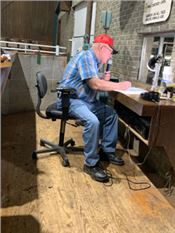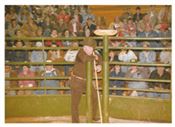|
SEMO Livestock Is 50

Charley at his station
Owners, Animals Come And Go, Mangels And Facility Remain
Betty Valle Gegg Naeger
MidAmerica Farmer Grower
FRUITLAND, MO.
No sale at SEMO Livestock barn has taken place without two permanent fixtures: the barn itself, and Charles Mangels, who has served the facility since its inception. He's done the same job all 50 years.
Many owners, animals, farmers and buyers have passed through the barn the past 50 years. Other changes have occurred too,
“We have become kind of a family, kind of like a small church,” Mangels said. “If someone isn’t there you can tell because they always sit in the same seat.”
Originally known as Fruitland Livestock Market, five men led by Harry McDowell started the business with the first sale held on Sept. 25, 1970. He was joined by Charlie Stencil, Stencil’s son-in-law Jerry Greenwood; then Bob and Dave Hale. After a few years, McDowell bought out the partnership. He eventually sold it to Dutch Meyr, who then sold it to Raymond and George Cox. After about 15 years it was sold to the Preusser family who kept it for 25 years. In 2018 after many successful years, the Preusser family decided it was time to retire. On July 1, 2018,
The sale barn was purchased by brothers, Dave Jr. and Mark Steinbecker along with Neal Franke, who had been the barn manager for many years under the Preussers. With each change of ownership, there was a slight change in the name of the business. With this last change, the sale barn is now operated as SEMO Livestock Sales.
“From the beginning I never got a promotion,” Mangels said without a hint of disappointment in his voice. His job: When the animals are sold, he keeps a record of the purchase and the buyer and tells the men and women in the holding area of the barn what pens to put the animals in. “We have to keep each buyer’s cattle separated from those of other buyers.”
Cattle have always been the main livestock sold at the sale barn. Originally sales were held on Friday's. During the Preussers' time of ownership they moved the cattle sale day to Tuesday to better serve the needs of the buyers. Over the years this facility has expanded both in size and types of activities. All types of animals have passed through this facility. In addition to Cattle, there have been hogs, horses, sheep and goats, to all sorts of exotic animals including birds, reptiles, and critters whose names you can't pronounce. The Cape County Cowboy Church started its humble beginnings in the arena of this facility, filling the air with praises to God above, until they outgrew the space and were able to build their own church building.
The barn continues to grow and host many events. From weekly cattle auctions on Tuesdays each month, hogs the fourth Tuesday, and sheep and goat sales the third Friday. It has added Farm Machinery Consignment Auctions spring and fall. Special sales of bred cows are held several times a year. For years it has hosted the University of Missouri Extension's Show-Me Select Bred Heifer Sales in May and December. There’s also a bred heifer sale in February where Mangels gets in on the action himself.
“I buy and sell bred heifers, I develop heifers,” he said. “I saw a need at the sale barn. Many guys have a job off the farm, and they don’t raise calves. I saw a need and I help them.” Mangels has built a great reputation and his heifers are highly sought after and fetch top price when they are sold.
SEMO Livestock is also a supporter of the FFA/4H Livestock program, hosting the cattle weigh-in in the spring and, due to the cancelation of the fairs, will host the Youth Livestock Sale on Sept. 19.
“One change I’ve noticed over the years is that everyone used to bring their animals in with a truck, there were no livestock trailers,” Mangels recalled. “Also, everything we did back then we did manually. The animals were put on the scale and someone weighed them. Now everything is done by computer.”
Animals don’t always go or stay where you try to put them, and he remembers those times well.
Mangels recalled one time particularly when a buyer purchased some very small pigs, and his trailer wasn’t built for pigs. People following him down the highway told of seeing some of that purchase falling out of the trailer as he went to his home.
“He didn’t get home with as many pigs as he bought,” Mangels said with a touch of humor.
Another change today from 50 years ago is the price paid for the animals. “There’s a lot of difference in the price they paid 50 years ago. It’s all in the trend. Food costs more now, everything has gone up.”
After 50 years, Mangels is there, still performing the same job, keeping track of the sale, the buyers and the animals.
“They (all the owners) have been very good to me. I’ve been through a lot of owners and I’m still here.” At a suggestion that he must be doing a great job, he quipped: “They don’t know any better.” He added: “It’s really been good. I’ve had some of the best people to work for.”
Anytime there’s a sale, Charley Mangels is there, and that will continue, as he has no plans to retire anytime soon. ∆
BETTY VALLE GEGG-NAEGER: Senior Staff Writer, MidAmerica Farmer Grower

The old name coming off building

Trucks that used to haul cattle in and out

Harry McDowell, one of the first owners

A current picture of building
|
|